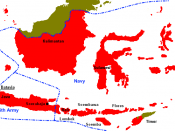The Occupation years were pivotal in improving the fortunes of the nationalists as there were varied advantages accrued by them under Japanese auspices. Even if the Japanese were largely motivated by self- interest, it is undeniable that certain obstacles confronting the nationalists were removed. Previously, most of the colonial masters were uncompromising in their policies towards the nationalists causing them to lack mass support and be subjected to colonial repression due to the lack of armed capacity and lack of progress in achieving independence. However, the Japanese Occupation provided amelioration to the development of nationalism- the nationalists were given more opportunities which allowed them to gain access to arms, garner mass support and progress towards independence. In addition, the position of the leftist groups also improved greatly.
On the other hand, it must be noted that in some colonies, the prospects of the nationalists did not improve and pre- Occupation problems remained or were magnified.
For example, the problem of factionalism within parties was not resolved. Nevertheless, it is undeniable that the Japanese Occupation was pivotal in improving the fortunes of the nationalists.
The Japanese's provision of platforms for nationalists to organize themselves made it possible for nationalists to secure a wider base of mass support. During the pre- Occupation years, rural- urban divide proved to be an obstacle to the nationalist attempts to win the support of the population. Those who sought collaboration with the colonial regimes lost their credibility in the eyes of the population. However, the Japanese encouraged the formation of plethora anti- Western, pro- Japanese, 'pan- Asian' mass organization. Unlike colonial powers, the Japanese unleashed mass grassroots political activity as seen in the case of formation of PUTERA in Indonesia. PUTERA was a puppet political body but the Indonesian leaders were able to exploit the freedom...


